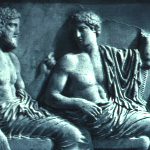
Greece

Selections from Aristotle's Politics
. . .
There will always be critics. Even when things are going pretty well, when the government is relatively stable, when more people than ever are living well, when the future looks promising -- even at these times, there are those whose need to speak out overcomes their mute acceptance of the status quo. PLATO'S description of SOCRATES shows the grizzled sage to be one such critic.
Socrates is typically Greek in his relentless questioning -- of himself, of authorities, of accepted traditions and practices. And Socrates' questioning displays another characteristic associated with the Greeks -- a belief in the capacity of the mind (rationality) to apprehend the universe and a concomitant belief in the power of language to come to terms with that understanding.
Not all Greek critics chose Socrates' direct approach. ARISTOPHANES' play Lysistrata hilariously lambastes war-mongers. Despite its playful ribaldry, Lysistrata was written at a time of great duress, when the welfare of the fragile Athenian city-state was threatened from hostile forces both inside and out. Yet, the play's parody displays its profound critique of contemporary society.
Likewise, SOPHOCLES' play Antigone is an outspoken critique of absolute power and unenlightened rule. The play details the disasters that befall a society in the midst of change, when long-accepted traditions conflict with interests of a new era.
That all people should be morally accountable for their actions is characteristic of Greek thought. For this reason, Socrates insists on accepting the punishment his fellow Athenians have meted out to him. Socrates is, to the end, a believer in democracy and the will of the majority despite his grievous doubts about honest self-questioning on the part of his fellow citizens. His friend Crito makes convincing arguments for Socrates' escape, yet the sage remains clear-thinking, hard-headed, and true to his moral principles: he accepts the sentence that has been given him. These three criteria well describe the Greeks. [Next]
Home | Near East | India | Egypt | China | Greece | Rome | Islam | Europe | Conclusions
Computer Services Provided by the University of Evansville.
Copyright © 1997. Exploring Ancient World Cultures.